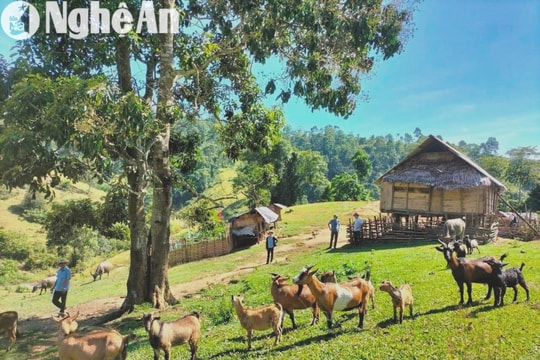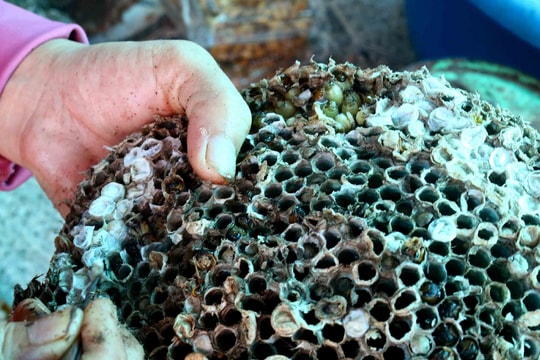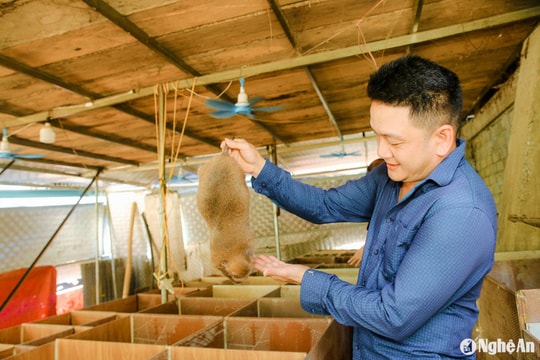Raising more than 2,000 pheasants, Nghe An farmers earn hundreds of millions each year
Ms. Nguyen Thi Chau's family in Quynh Hoa commune, Quynh Luu district (Nghe An) after 3 years of investing in pheasant farming has an income of hundreds of millions of dong/year.

Talking to us about her chance to start raising pheasants, Ms. Nguyen Thi Chau in village 4, Quynh Hoa commune, districtQuynh Luusaid: In the past, the family also raised many types of poultry such as chickens, geese, and ducks on a large scale. There were successes but also many failures, so the family's economy still faced difficulties. Since then, she has always struggled to find new directions in economic development.
“3 years ago, I saw my neighbor raising nearly 10 pheasants to lay eggs and sell them for meat. After researching, I realized that pheasants are wild animals with an economic value 2-3 times higher than other poultry, so I came up with the idea of investing in and raising this type of animal.

In February 2021, after learning about the growth, development and care of pheasants through social networks, I boldly borrowed more than 100 million VND from the bank to build a barn and found facilities in the North to buy 600 breeding birds to start my business," Ms. Chau recounted.
Mr. Ho Sy Thai (Ms. Chau's husband) also shared that because of limited capital, from the technique to how to build a cage, Mr. Thai consulted on social networks and then did it himself to save costs. Pheasants are shy of people and fly high, so the cage must be designed with a high, airy frame, and a tight fence around it to prevent the bird from flying out. This is a heat-loving species, so the cage must be covered tightly to increase the temperature. Under the floor is a thick layer of rice husks to keep warm, and a part of the cage is filled with sand to build a house for the birds to eat gravel and bathe in sand. The cage must be cleaned regularly and have clean water.

Every day, Chau and her husband take advantage of the time to collect water hyacinth and grow water spinach as regular food for pheasants to reduce the amount of rice and industrial food, saving on expenses.
“Every 15 to 20 days, I give the birds medicine to prevent diseases such as flu, pneumonia, intestinal diseases, and septicemia. Pheasants are more difficult to care for than other poultry, so care must be regular to avoid loss of offspring and ensure good growth and development,” Ms. Chau added.
According to Ms. Chau, the most difficult stage in raising pheasants is brooding. During this period, if not taken care of properly, the chicks will be lost and their growth and development will be affected. The temperature in the cage must always be between 37 and 38 degrees Celsius. The cage must be clean and airy. Closely monitor sick or uneaten birds to separate them from the flock, treat them, and avoid spreading the disease to other birds.
Thanks to efforts in raising animals, from the initial 600 birds, Ms. Chau's family has now expanded the barn, developed the flock of pheasants to more than 2,000 birds and earned hundreds of millions of dong each year.
Pheasants lay eggs all year round, but are most productive in the summer. At this time last year, Ms. Chau's family only harvested 120 to 130 eggs per day. But thanks to good care, since the beginning of the year, the family has harvested an average of 200 to 300 eggs per day, with the current wholesale price being 6,000 VND per egg. After deducting expenses, the income from selling eggs is nearly 1 million VND per day.

In addition, Ms. Chau's family also sells 100-150 breeding birds every month at an average price of 20,000-25,000 VND/bird. Pheasants for meat are raised for 5-7 months, weigh from 1.5kg to 2kg and are sold at prices ranging from 180,000-200,000 VND/kg.
Mr. Tran Van Sam - Vice Chairman of Quynh Hoa Commune People's Committee said that with their way of thinking, way of doing, and determination, Ms. Nguyen Thi Chau's family has affirmedmodelRaising pheasants is effective and a suitable direction for farmers who want to get rich on their homeland./.


.jpg)


